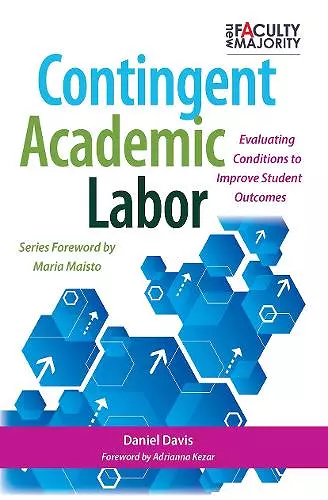Contingent Academic Labor
Evaluating Conditions to Improve Student Outcomes
Format:Paperback
Publisher:Taylor & Francis Inc
Published:2nd Oct '17
Currently unavailable, and unfortunately no date known when it will be back
This paperback is available in another edition too:
- Hardback£145.00(9781620362518)

Contingent Academic Labor is a concise guide that offers higher education professionals a way to measure the degree of equality taking place in work environments for non-tenure track faculty across institutional settings. It frames the relevant issues and examines the nationwide situation facing contingent faculty across the professional landscape. The goal is to review contingent faculty treatment, and offer a standardized way to identify both equitable and unjust practices that impact adjunct faculty and their students by extension.The main feature of this guide is The Contingent Labor Conditions Score, a tool to help evaluate current labor practices that impact adjuncts in both positive and negative ways. The report card measures 3 areas of labor conditions:*Material Equity: Pay, job security and benefits*Professional Equity: Opportunities for advancement, professional development, academic freedom, sense of professional inclusion, and job satisfaction*Social Equity: Gender and race parity between contingent and non-contingent faculty in proportion to the population servedThis book will be useful for administrators and labor organizers alike in assessing the degree of exploitation, or empowerment, in their own institution. The Contingent Labor Conditions Score, as a standardized tool, will serve audiences on both sides of the discussion in creating positive steps forward, improving not only contingent faculty working conditions, but ultimately improving student outcomes.
"In this book, Daniel B. Davis has proposed an important practical tool for addressing the contingent faculty crisis and ensuring that all stakeholders participate in the transformation of higher education into a site of authentic excellence, and commitment to equity and equality."
From the Foreword:
“This book, in my estimation, is one of the most important books focused on contingent faculty in higher education…I highly recommend this book to leaders within unions, academic administrators, faculty leaders - both tenure-track and contingent - as THE approach for advancing equity on college campuses.”
Adrianna Kezar, PhD, Professor, USC, Co-director Pullias Center and Director Delphi Project
"Contingent Academic Labor by Daniel Davis is a timely, relevant, and necessary text that pushes us all to reconsider the treatment of non-tenure track academic faculty and the implications this treatment has for students. The book is an organized and concise work targeted at all who are (or should be) concerned with the treatment of contingent faculty: faculty, students, administrators, researchers, labor unions, etc. This work builds off of successful tools geared toward advancing equity in higher education like the Equity Scorecard (Bensimon, Hao, Bustillos, 2006) and offers a useful gauge for campus stakeholders to take the temperature regarding contingent faculty treatment and experiences in higher education.
In the introduction, Davis sets the stage for the present conditions contingent faculty face working in a higher education environment that underpays, undervalues, and under-employs them. Despite the growing number of contingent faculty members, their treatment indicates higher education has taken for granted their import to student success. Davis divides the book into three parts so that the reader first has a foundation of the broader context and conditions of academic labor. He then depicts the variety of working conditions for contingent faculty and ends with an overview of the utility of the Labor Conditions Score developed to aid higher education institutions in assessing the environments in which their contingent faculty work.
It is clear that no one wins with the present treatment of contingent faculty members. One participant interviewed for this work said, 'I don’t understand why this situation persists when it’s a lose-lose-lose scenario. There has to be a better way' (p. 22). When the faculty members are struggling to survive, they oftentimes cannot recognize or address the challenges students face. The use of a tool like the Contingent Labor Conditions Scorecard can help move institutions towards maximizing student experiences and outcomes. The tool can also help better assess the feelings of contingent faculty members in their current roles. The text will certainly prompt additional discussion and direct attention to this important topic of contingent faculty, and hopefully those who read it will push for institutions to convert the knowledge shared into meaningful actions that will benefit all campus stakeholders."
Teachers College Record
“Daniel Davis got the single most important thing about current contingent faculty right (besides their extreme exploitation, of course), which is that most of us would rather be full-time, job-secure (tenured or otherwise) faculty. It is amazing how many writers get that wrong. One could hope that most of the book’s cogent prescriptions for change will not be ignored by the vast majority of the intended audience: administrators and trustees. The rest of us with a stake in higher education cannot afford to ignore this book and its very reasonable ideas for change. I look forward to his next book about how to get there.”
Joe T. Berry, author of Reclaiming the Ivory Tower: Organizing adjuncts to change higher education. (Monthly Review Press, 2005) and editor of the weekly news aggregator COCAL UPDATES for contiongent
“Provides a tool that institutions and/or advocates can use to spur and guide reform. For readers new to conversations about contingent faculty, [this] is a good place to start – but it is not just for beginners. This book’s synthesis of recent work in the field is useful for anyone interested in understanding and evaluating local campus conditions. For starters, institutions should care about the working conditions of their contingent faculty because of their impact on students.”
Change: The Magazine of Higher Learning
ISBN: 9781620362525
Dimensions: unknown
Weight: 226g
136 pages